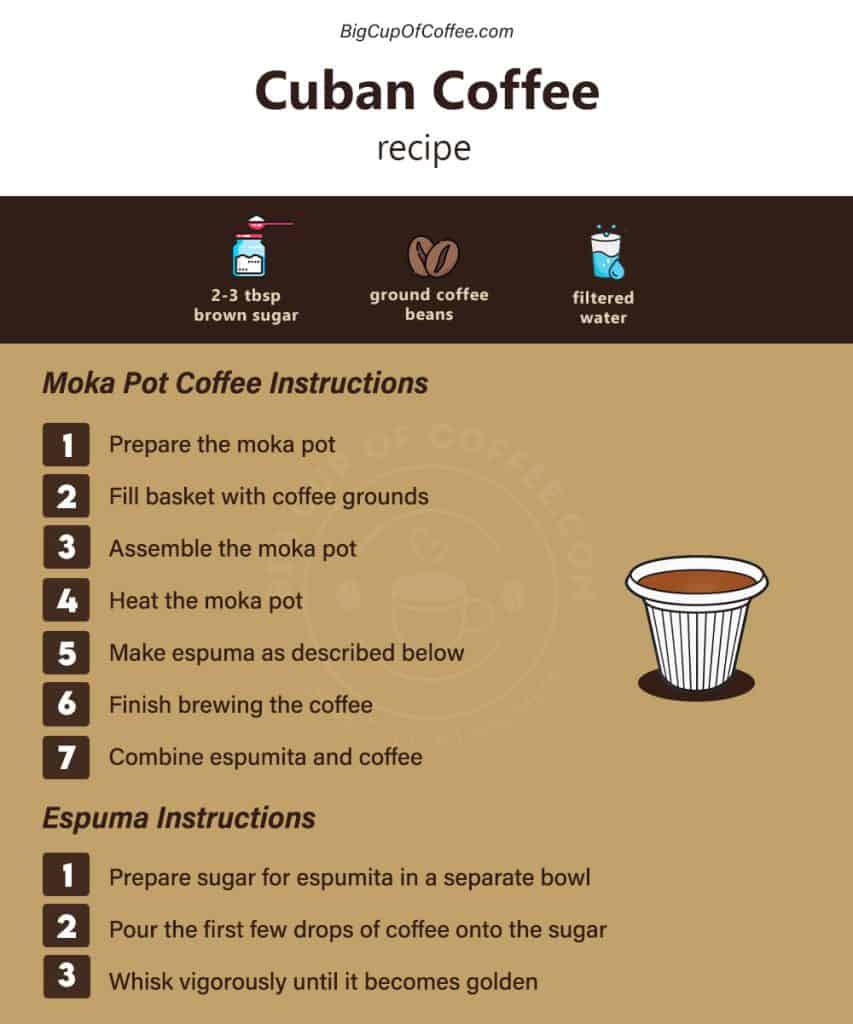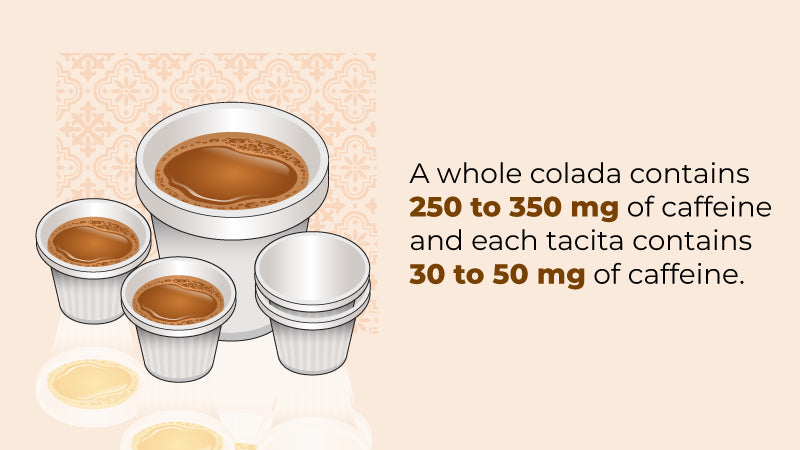Ever found yourself craving a cup of Cuban coffee and wondered just how much caffeine you’re about to sip? You’re not alone.
This intense and flavorful brew has a reputation for its boldness, but there’s more to it than meets the eye—or the taste buds. If you’re curious about what exactly is in your cup and how it stacks up against your usual coffee choices, you’re in the right place.
Understanding the caffeine content can help you make better decisions about your daily caffeine fix and enhance your appreciation for this beloved beverage. Keep reading to discover just how much kick Cuban coffee really packs and what that means for you.

Credit: www.amazon.com
Cuban Coffee Origins
Cuban coffee is a rich tapestry woven with history and tradition. Its robust flavor is a direct reflection of Cuba’s vibrant culture and spirited people. As you sip a cup of Cuban coffee, you’re tasting a legacy of resilience and ingenuity.
Historical Roots
Cuban coffee has deep historical roots that trace back to the 18th century. Coffee cultivation began in the eastern region of the island, with French immigrants introducing the practice. They brought coffee plants and their expertise, laying the foundation for Cuba’s coffee culture.
By the 19th century, coffee plantations flourished, becoming a significant part of Cuba’s economy. The rich volcanic soil and tropical climate provided ideal conditions for coffee growth. This period saw Cuba emerging as one of the leading coffee producers globally.
Traditional Brewing Methods
The traditional brewing methods of Cuban coffee are as unique as its origins. The most popular method is the “cafecito,” a small but mighty espresso shot. It’s brewed using a moka pot, which creates a bold and concentrated flavor.
Preparation involves adding sugar directly to the espresso, transforming it into a sweet, frothy delight known as “espumita.” The process of making cafecito is almost ceremonial, reflecting the importance of coffee in Cuban daily life. Have you ever tried making Cuban coffee at home?
Another traditional method is the “colada,” which is a larger serving meant to be shared. It encourages social interaction and community bonding, capturing the essence of Cuban hospitality. This act of sharing coffee is a testament to the communal spirit that defines Cuban culture.
Next time you brew coffee, think about the rich history and tradition behind your cup. How does your coffee experience compare to the communal spirit of Cuban coffee?
Caffeine Content Factors
Understanding the caffeine content in Cuban coffee involves several factors. It’s not just about the type of coffee you choose; how you prepare it matters too. From the bean variety to the brewing method, each detail plays a crucial role in determining the caffeine levels. Let’s dive into the specifics.
Bean Variety
The type of coffee bean you use significantly impacts caffeine content. Cuban coffee often uses Arabica beans, known for their smooth flavor. These beans generally contain less caffeine compared to Robusta beans. If you’re a caffeine enthusiast, experimenting with different beans might offer surprising results.
Roasting Techniques
Roasting is more than just a step in coffee preparation; it’s an art that affects caffeine levels. Dark roast Cuban coffee might taste stronger, but it actually contains less caffeine than lighter roasts. The roasting process reduces caffeine, so don’t judge a coffee’s potency solely by its color.
Brewing Time And Temperature
How you brew your Cuban coffee influences its caffeine content. Longer brewing time can extract more caffeine, giving you an extra kick. However, brewing at too high a temperature can burn the coffee, affecting its taste. Have you tried adjusting your brew time or temperature to see how it changes the caffeine punch?
The next time you sip your Cuban coffee, consider these factors. They might just change your daily coffee experience. What adjustments will you make to optimize your caffeine intake?
Comparing Cuban Coffee To Other Types
Cuban coffee is known for its bold flavor and rich aroma. This coffee offers a unique experience that stands out from other types. Understanding its caffeine content compared to other coffee varieties helps highlight its distinct nature.
Espresso Vs. Cuban Coffee
Espresso is famous for its intense flavor and high caffeine. Cuban coffee shares this intensity but with a sweeter touch. Espresso shots contain a concentrated caffeine punch. Cuban coffee, brewed with sugar, softens the bitter notes. Espresso typically has 63 mg of caffeine per ounce. Cuban coffee offers a similar amount, yet the sweetness makes it more palatable. The brewing process influences the caffeine levels, making each sip a unique experience.
Cuban Coffee Vs. American Coffee
American coffee is milder and served in larger cups. Cuban coffee contrasts with its strong, small servings. American coffee averages 95 mg of caffeine per cup. Cuban coffee provides a more concentrated caffeine dose in smaller quantities. This difference in serving size and strength marks the Cuban coffee as distinct. The boldness of Cuban coffee stands out in comparison to the gentle nature of American brews.

Credit: www.embassyofpakistanusa.org
Health Implications
Cuban coffee packs a strong caffeine punch, influencing heart rate and blood pressure. Consuming it in moderation is crucial to avoid jitters and sleep disturbances. Understanding its potency helps in managing health impacts effectively.
Cuban coffee, renowned for its bold flavor and rich aroma, also packs a punch when it comes to caffeine content. While this invigorating brew offers a delightful start to your day, understanding its health implications is crucial. Caffeine can be your ally, but it’s essential to know both sides of the coin.Benefits Of Caffeine
Caffeine can boost your energy and alertness. You might find yourself more focused after a cup of Cuban coffee, ready to tackle your tasks with renewed vigor. This stimulant can also enhance physical performance. Imagine gearing up for a workout with a bit more enthusiasm. Caffeine may improve your mood. A sip of Cuban coffee can make you feel more upbeat, potentially brightening your day.Potential Risks
Too much caffeine can lead to jitteriness. Have you ever felt your heart racing after that extra cup? It’s a sign to slow down. Caffeine can affect sleep. Finding yourself tossing and turning at night? Consider how late you’re indulging in your coffee ritual. Increased caffeine intake can cause dependency. Ask yourself: Are you reaching for coffee out of habit rather than need? Balancing caffeine consumption is key. How can you enjoy the benefits without tipping into the risks?Cultural Significance
Cuban coffee, known for its bold flavor, contains a significant amount of caffeine. This strong brew plays a vital role in Cuban culture, often enjoyed during social gatherings and daily routines. Its robust taste and invigorating effect make it a popular choice among coffee enthusiasts.
Cuban coffee isn’t just a drink; it’s a rich cultural tradition that shapes the daily life of many Cubans. The bold, strong flavor of Cuban coffee, often served as a “cafecito,” is both a morning ritual and a symbol of hospitality. Understanding its cultural significance can deepen your appreciation for this vibrant beverage and its role in Cuban society.Coffee Rituals In Cuba
Coffee in Cuba is more than a morning pick-me-up; it’s a cherished ritual. Families gather around their kitchens, brewing coffee together and sharing stories. It’s common to see Cubans savoring a small cup of espresso, known as a “cafecito,” at any time of the day. The process of making Cuban coffee is deeply rooted in tradition. This might remind you of how you cherish certain rituals in your daily life, like enjoying a peaceful morning routine. Just as you might find comfort in these rituals, Cubans find a sense of community and continuity in their coffee traditions.Social Aspects Of Coffee Consumption
Coffee in Cuba is also a social glue, bringing people together. It’s customary to offer a cup of coffee to visitors, making it a gesture of goodwill and friendship. You’ll notice how coffee acts as a conversational bridge, sparking discussions and laughter. Imagine walking through a Cuban neighborhood and being invited in for a cafecito. This simple act can turn strangers into friends, highlighting the social importance of coffee. Have you experienced a moment where a shared drink led to a deeper connection? Cuban coffee does just that, reinforcing bonds and creating new ones. Cuban coffee, with its strong flavor and cultural weight, invites you to reflect on your own social rituals. Next time you sip a cup, consider the traditions and connections it may represent, just as Cuban coffee does for its people.
Credit: bigcupofcoffee.com
Tips For Brewing Cuban Coffee
Cuban coffee packs a strong caffeine punch, offering a robust flavor with a unique brewing style. The traditional method uses finely ground coffee and a small amount of sugar, resulting in a sweet and potent espresso. It’s perfect for those seeking a bold coffee experience without compromising flavor.
Brewing Cuban coffee is an art that transforms simple ingredients into a rich, robust beverage. This coffee, known for its intense flavor and high caffeine content, is a staple in Cuban culture. Whether you’re a coffee enthusiast or a curious beginner, mastering the art of brewing Cuban coffee will elevate your coffee experience. Let’s dive into the essential tips that will help you brew the perfect cup.Essential Ingredients
To brew authentic Cuban coffee, you need a few key ingredients. First, the coffee grounds. Choose finely ground espresso coffee for that bold flavor that Cuban coffee is famous for. Second, sugar. Cuban coffee is not just strong; it’s sweet. Use white granulated sugar to create the classic sweet foam, known as “espumita”. Third, water. Always use fresh, filtered water for the best taste. Finally, a stovetop espresso maker, often called a “cafetera” or “moka pot,” is essential for brewing.Step-by-step Guide
Brewing Cuban coffee involves a few simple steps. Start by adding water to the bottom chamber of your cafetera. Fill it up to the valve but no higher. Next, fill the filter basket with coffee grounds. Press them down gently with a spoon to ensure a good brew. Place the cafetera on the stove and heat it over medium flame. While it’s brewing, prepare the sugar foam. Add a few teaspoons of sugar to a cup and mix a small amount of the first brewed coffee into the sugar. Stir vigorously until it turns into a creamy, light brown foam. Once the coffee is fully brewed, pour it into a cup. Add the sugar foam on top, and stir gently. This step is crucial—it’s what gives Cuban coffee its signature taste and texture. Doesn’t this sound like a delightful ritual to start your day? Imagine the aroma filling your kitchen. As you sip, you’re not just drinking coffee; you’re experiencing a slice of Cuban culture. Wouldn’t you agree that brewing coffee is not just about the drink, but also about the experience?Frequently Asked Questions
Is Cuban Coffee More Caffeinated?
Cuban coffee is often more caffeinated due to its strong brewing process and dark roast. It uses finely ground beans, creating a bold flavor. Cafecito, a popular Cuban coffee type, typically contains more caffeine than regular coffee. Enjoy Cuban coffee for a rich and robust experience.
Is Cuban Coffee The Strongest?
Cuban coffee is known for its bold flavor and high caffeine content. It is considered one of the strongest coffees globally. The unique brewing method contributes to its intense taste and rich aroma, making it a favorite for those who prefer strong coffee.
How Much Caffeine Is In A Cuban Roast Coffee?
Cuban roast coffee typically contains 30-50 mg of caffeine per ounce. The exact amount varies by brewing method. It’s known for its strong, bold flavor and rich aroma. Caffeine content can also depend on the coffee bean type and roasting duration.
Enjoy it in moderation for a flavorful experience.
How Much Caffeine Is In Café De Cuba?
Café de Cuba typically contains about 30-50 mg of caffeine per ounce. This amount varies depending on preparation. Cuban coffee is known for its strong flavor and robust caffeine content, making it a popular choice among coffee enthusiasts. Always check specific brands for exact caffeine levels.
Conclusion
Cuban coffee packs a punch with its caffeine content. It’s bold and strong. Perfect for those who love a robust flavor. Each sip is a burst of energy. Ideal for starting your day. Or for a mid-afternoon boost. Remember, moderation is key.
Too much caffeine can affect sleep. Enjoy Cuban coffee, but know your limits. Savor its unique taste. Embrace its rich culture. Share it with friends and family. It’s more than just a drink. It’s an experience. A tradition. A piece of Cuba in every cup.
Discover it today, and enjoy every moment.







